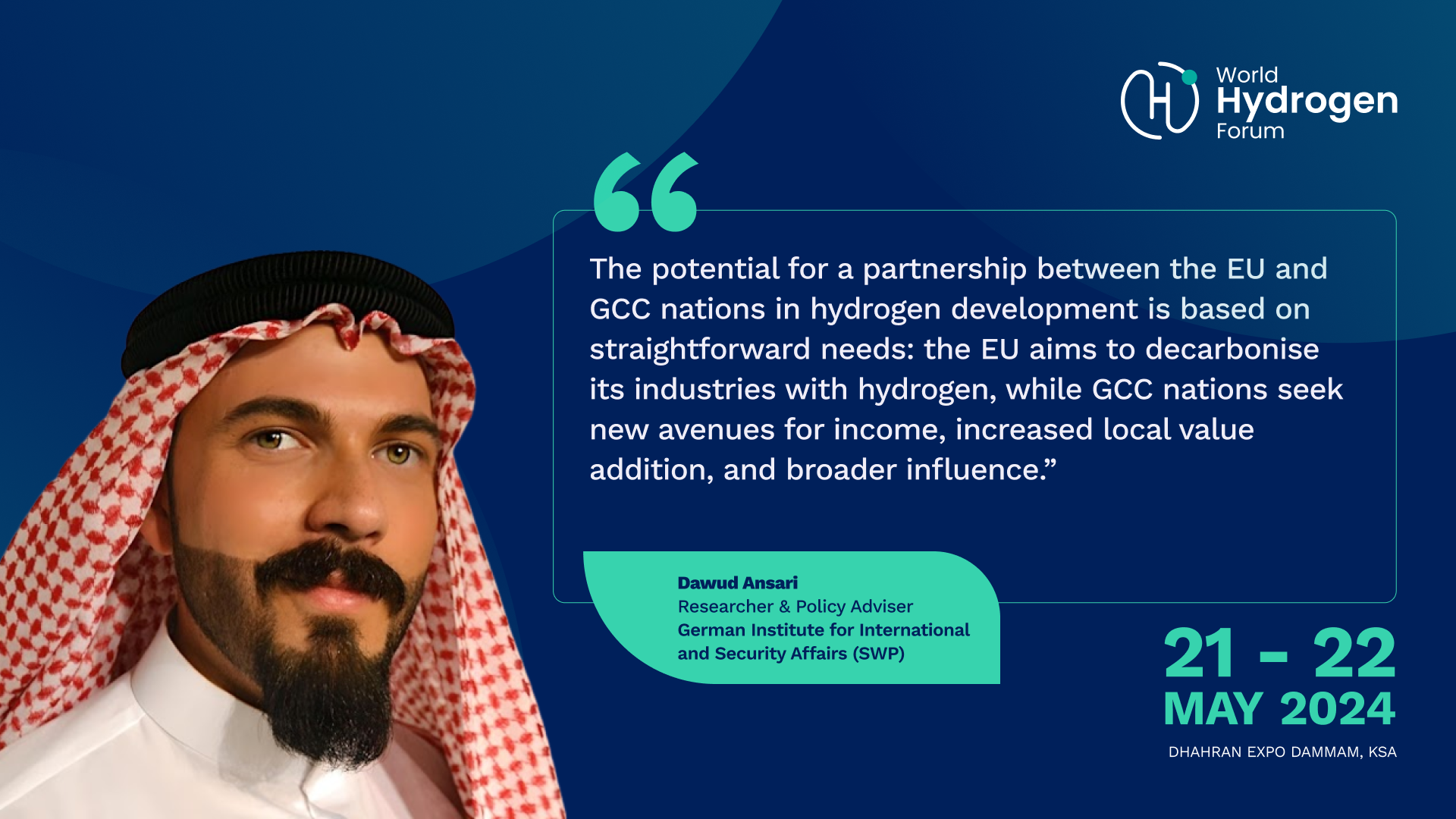We are delighted to present the Q&A session with Dr Dawud Ansari, a distinguished researcher and policy adviser renowned for his expertise in energy, geopolitics, and applied economics. Dr Ansari, currently affiliated with the German Institute for International and Security Affairs (SWP) and the Majan Center for Energy MCREEE, is at the forefront of exploring the intricate dynamics of hydrogen geopolitics and its implications for global energy landscapes.
In today's session, we delve into the evolving narrative surrounding hydrogen, a versatile energy carrier poised to revolutionise traditional energy paradigms. Dr. Ansari's insights offer invaluable perspectives on the potential collaboration between the European Union (EU) and Gulf Cooperation Council (GCC) nations in harnessing hydrogen's transformative power.
Join us as we unravel the intricacies of hydrogen geopolitics and explore the transformative potential of EU-GCC collaboration in shaping the future of energy on a global scale.
#WHF: While hydrogen is discussed globally, are there specific regions or countries you believe will play an especially critical role in shaping the hydrogen geopolitical landscape in the next 5-10 years?
Dr Dawud Ansar: The geopolitics of hydrogen differ from those of fossil fuels, but they are very much alive – the rules may be different, but the game is the same. Renewable energy resources are indeed more widespread than fossil ones, but critical raw materials, technology ownership, industry, and the political power to define standards remain concentrated. In the first decade, only a handful of countries have the financial, occupational, administrative, and infrastructural capacities to participate in the emerging hydrogen world. Countries that own technology and import hydrogen – particularly the EU, Japan, and Korea – will play a critical role in defining how the sector unfolds, but they won’t be the sole deciders. Front-runners on the supply side, such as Oman and Saudi Arabia, will certainly shape relations in the short run, but the owners of raw materials and their refining capacities – especially South Africa and China – will be decisive for the market's future. A lot will depend on the US: their actual involvement in the sector and to what extent they consider it a key technology in their rivalry with China will significantly influence the distribution of power.
#WHF: What are the most promising areas of synergy between the EU and GCC nations in developing a hydrogen partnership? How could their unique strengths complement each other for mutual benefit?
Dr Dawud Ansar: The potential for a partnership between the EU and GCC nations in hydrogen development is based on straightforward needs: the EU aims to decarbonise its industries with hydrogen, while GCC nations seek new avenues for income, increased local value addition, and broader influence. Unlike other prospective hydrogen producers who may become relevant in the future, GCC nations have the advantage of leveraging existing infrastructure, institutions, human capital, and financial resources to kickstart the hydrogen economy. On the other hand, the EU, as one of the most significant industrial hubs, has the potential to generate significant offtake, given the right domestic incentives – which is crucial to stimulating supply and encouraging further innovation.
#WHF: Beyond decarbonization, how could a growing hydrogen industry drive broader economic development? Could it impact job creation, technology innovation, or international trade?
Dr Dawud Ansar: Short answer – it depends. Hydrogen differs substantially from oil and gas: first, margins are lower, meaning that the profit hydrogen-producing countries can gain are lower than those in oil and gas, so exporters will need to onshore different parts of the hydrogen value chain to create a meaningful economic impact. Second, the sector is more capital intensive – meaning that the potential for job creation within hydrogen production is very limited. This, too, highlights the importance of onshoring further parts of the value chains which may hold more job potential. Such action is essential but needs strategic planning, as it can create competition with others: Importers often seek to use hydrogen to maintain their own industries or sell their production technologies.
#WHF: What are the key opportunities for successfully integrating hydrogen into existing energy systems? Could you highlight areas where infrastructure development or technological breakthroughs could accelerate widespread adoption?
Dr Dawud Ansar: Incumbent energy giants will continue to play a major role in developing hydrogen, as extensive know-how, especially from the LNG and refinery business, helps kickstart the hydrogen sector. This includes national energy companies in exporting countries as well as international oil companies, which often act as investors. Physical infrastructure is also important – existing infrastructure can be upgraded, and we will need to build new infrastructure. Technological innovation in maritime transport will be crucial to enable an international hydrogen economy. Currently, transport options are not fully mature and excessively expensive. Their technological development could decide whether hydrogen becomes a globally traded commodity, or an energy carrier produced locally, then used to manufacture energy-intensive goods. This has crucial implications for industry (re)location.
#WHF: How do events like the World Hydrogen Forum drive innovation, collaboration, and progress within the global hydrogen economy?
Dr Dawud Ansar: Currently, much of this sector develops through bilateral structures and informal processes. Events like the World Hydrogen Forum not only offer a platform for experts and innovators to discuss but also provide a snapshot of the industry. They help us identify where future action is most needed, and it may even foster regional and global hydrogen collaboration and governance systems. These efforts are crucial for coordinating and developing the sector.

